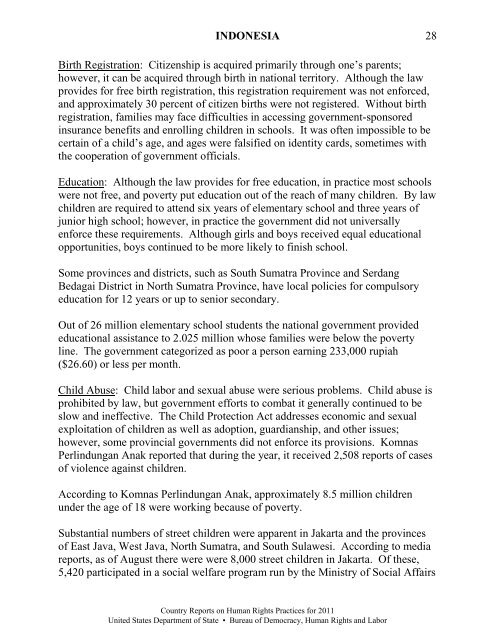INDONESIA EXECUTIVE SUMMARY Indonesia is a multiparty ...
INDONESIA EXECUTIVE SUMMARY Indonesia is a multiparty ...
INDONESIA EXECUTIVE SUMMARY Indonesia is a multiparty ...
Create successful ePaper yourself
Turn your PDF publications into a flip-book with our unique Google optimized e-Paper software.
<strong>INDONESIA</strong> 28<br />
Birth Reg<strong>is</strong>tration: Citizenship <strong>is</strong> acquired primarily through one’s parents;<br />
however, it can be acquired through birth in national territory. Although the law<br />
provides for free birth reg<strong>is</strong>tration, th<strong>is</strong> reg<strong>is</strong>tration requirement was not enforced,<br />
and approximately 30 percent of citizen births were not reg<strong>is</strong>tered. Without birth<br />
reg<strong>is</strong>tration, families may face difficulties in accessing government-sponsored<br />
insurance benefits and enrolling children in schools. It was often impossible to be<br />
certain of a child’s age, and ages were falsified on identity cards, sometimes with<br />
the cooperation of government officials.<br />
Education: Although the law provides for free education, in practice most schools<br />
were not free, and poverty put education out of the reach of many children. By law<br />
children are required to attend six years of elementary school and three years of<br />
junior high school; however, in practice the government did not universally<br />
enforce these requirements. Although girls and boys received equal educational<br />
opportunities, boys continued to be more likely to fin<strong>is</strong>h school.<br />
Some provinces and d<strong>is</strong>tricts, such as South Sumatra Province and Serdang<br />
Bedagai D<strong>is</strong>trict in North Sumatra Province, have local policies for compulsory<br />
education for 12 years or up to senior secondary.<br />
Out of 26 million elementary school students the national government provided<br />
educational ass<strong>is</strong>tance to 2.025 million whose families were below the poverty<br />
line. The government categorized as poor a person earning 233,000 rupiah<br />
($26.60) or less per month.<br />
Child Abuse: Child labor and sexual abuse were serious problems. Child abuse <strong>is</strong><br />
prohibited by law, but government efforts to combat it generally continued to be<br />
slow and ineffective. The Child Protection Act addresses economic and sexual<br />
exploitation of children as well as adoption, guardianship, and other <strong>is</strong>sues;<br />
however, some provincial governments did not enforce its prov<strong>is</strong>ions. Komnas<br />
Perlindungan Anak reported that during the year, it received 2,508 reports of cases<br />
of violence against children.<br />
According to Komnas Perlindungan Anak, approximately 8.5 million children<br />
under the age of 18 were working because of poverty.<br />
Substantial numbers of street children were apparent in Jakarta and the provinces<br />
of East Java, West Java, North Sumatra, and South Sulawesi. According to media<br />
reports, as of August there were were 8,000 street children in Jakarta. Of these,<br />
5,420 participated in a social welfare program run by the Min<strong>is</strong>try of Social Affairs<br />
Country Reports on Human Rights Practices for 2011<br />
United States Department of State • Bureau of Democracy, Human Rights and Labor
















